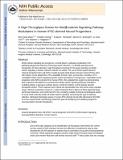A High-Throughput Screen for Wnt/β-Catenin Signaling Pathway Modulators in Human iPSC-Derived Neural Progenitors
Author(s)
Zhao, Wen-Ning; Cheng, Chialin; Theriault, Kraig M.; Sheridan, Steven D.; Tsai, Li-Huei; Haggarty, Stephen J.; ... Show more Show less
DownloadTsai_A high-througput screen.pdf (2.136Mb)
OPEN_ACCESS_POLICY
Open Access Policy
Creative Commons Attribution-Noncommercial-Share Alike
Terms of use
Metadata
Show full item recordAbstract
Wnt/β-catenin signaling has emerged as a central player in pathways implicated in the pathophysiology and treatment of neuropsychiatric disorders. To identify potential novel therapeutics for these disorders, high-throughput screening (HTS) assays reporting on Wnt/β-catenin signaling in disease-relevant contexts are needed. The use of human patient–derived induced pluripotent stem cell (iPSC) models provides ideal disease-relevant context if these stem cell cultures can be adapted for HTS-compatible formats. Here, we describe a sensitive, HTS-compatible Wnt/β-catenin signaling reporter system generated in homogeneous, expandable neural progenitor cells (NPCs) derived from human iPSCs. We validated this system by demonstrating dose-responsive stimulation by several known Wnt/β-catenin signaling pathway modulators, including Wnt3a, a glycogen synthase kinase-3 (GSK3) inhibitor, and the bipolar disorder therapeutic lithium. These responses were robust and reproducible over time across many repeated assays. We then conducted a screen of ~1500 compounds from a library of Food and Drug Administration–approved drugs and known bioactives and confirmed the HTS hits, revealing multiple chemical and biological classes of novel small-molecule probes of Wnt/β-catenin signaling. Generating these type of pathway-selective, cell-based phenotypic assays in human iPSC-derived neural cells will advance the field of human experimental neurobiology toward the goal of identifying and validating targets for neuropsychiatric disorders.
Date issued
2012-08Department
Picower Institute for Learning and MemoryJournal
Journal of Biomolecular Screening
Publisher
Sage Publications
Citation
Zhao, Wen-Ning, Chialin Cheng, Kraig M. Theriault, Steven D. Sheridan, Li-Huei Tsai, and Stephen J. Haggarty. “A High-Throughput Screen for Wnt/β-Catenin Signaling Pathway Modulators in Human iPSC-Derived Neural Progenitors.” Journal of Biomolecular Screening 17, no. 9 (August 24, 2012): 1252–1263.
Version: Author's final manuscript
ISSN
1087-0571
1552-454X